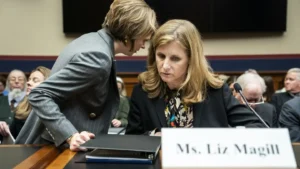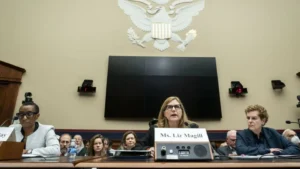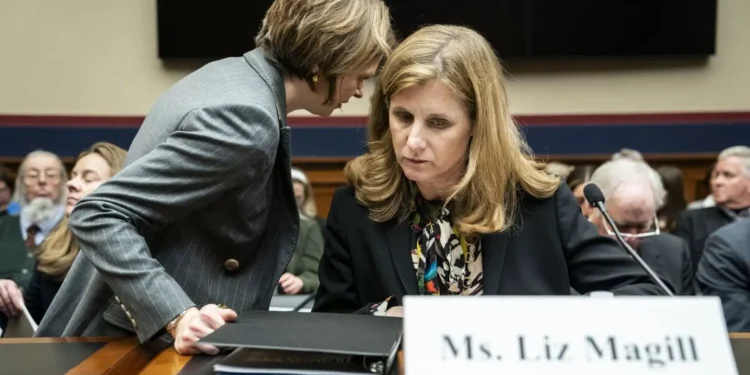
In a shocking turn of events, University of Pennsylvania President Liz Magill has resigned amidst a firestorm of controversy stemming from her recent testimony on antisemitism before Congress. The decision to step down followed widespread public outrage, particularly from Penn alumni and elected officials who expressed deep dissatisfaction with Magill’s handling of the sensitive issue.
The tipping point came during Magill’s appearance on Capitol Hill, where she, along with the presidents of Harvard and MIT, faced criticism for her failure to unequivocally condemn calls for the genocide of Jews. This refusal sparked intense backlash, leading to mounting pressure on Magill from various quarters, including the possibility of imminent termination by the school’s board of trustees.
Board of Trustees Chairman Scott L. Bok issued a statement confirming Magill’s resignation, stating, “I write to share that President Liz Magill has voluntarily tendered her resignation as President of the University of Pennsylvania. She will remain a tenured faculty member at Penn Carey Law.”
Bok also revealed that Magill had agreed to stay on until an interim president is appointed, a move aimed at ensuring a smooth transition during this tumultuous period. The resignation marks a significant moment in the history of the University of Pennsylvania, raising questions about the handling of sensitive issues and the expectations placed on university leaders in addressing matters of national importance.
Stefanik Applauds Resignation of UPenn President Liz Magill: ‘One Down. Two to Go

In a heartfelt statement, Liz Magill, now former President of the University of Pennsylvania, expressed gratitude for the opportunity to serve the institution and collaborate with its diverse community. She acknowledged the privilege of working alongside faculty, students, staff, alumni, and community members to advance the university’s essential missions.
Magill’s resignation came in the wakeof a series of critical events, with major donor Ross Stevens retracting a substantial $100 million gift to the school in protest of the university’s perceived mishandling of antisemitism on campus and dissatisfaction with Magill’s leadership. The Wharton business school board at Penn also joined the chorus, requesting Magill’s resignation, while the university’s board of trustees convened for an emergency meeting in response to mounting backlash surrounding her controversial comments.
The catalyst for these actions appears to be Magill’s widely criticized Congressional testimony, which several key figures, including Stevens and the Wharton board, pointed to as the primary factor motivating their decisions. The fallout from this incident underscores the delicate balance leaders must navigate when addressing sensitive issues and the significant repercussions that can result from perceived missteps on matters of national importance.
UPenn Faces Setback as Major Donor Rescinds $100M Gift Following President’s Controversial Congressional Testimony on Antisemitism
Despite resigning from her position as President of the University of Pennsylvania, Liz Magill will maintain her role as a tenured faculty member at the university’s law school. The controversy surrounding Magill erupted after her recent testimony before the House Education and Workforce Committee, during which she refrained from unequivocally stating that antisemitic chants and calls for the genocide of Jewish people violate the school’s code of conduct.

Magill’s refusal to provide a clear condemnation of such actions sparked widespread criticism and raised concerns about the university’s stance on addressing antisemitism. The fallout from her testimony has not only led to her resignation but also prompted a major donor to withdraw a significant $100 million gift to the university, underscoring the tangible impact of these events on the institution’s financial support.
As Magill transitions to her role within the faculty, the University of Pennsylvania now faces the challenge of rebuilding trust and addressing the fallout from the controversy within the university community and among its donors and stakeholders.
Pfizer CEO Criticizes Presidents of Elite Colleges as ‘Despicable’ Over Handling of Antisemitism











_after_crash_landing-360x180.jpg)

































